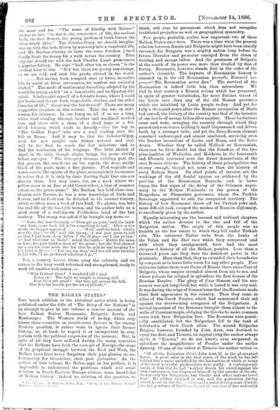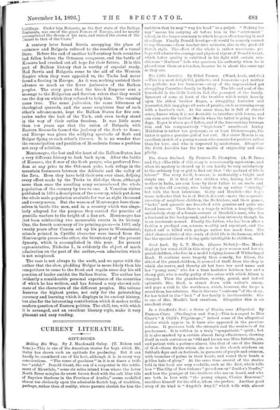THE BALKAN STATES.* THE latest addition to the historical series
which is being published under the title of "The Story of the Nations" is an attempt to give in one volume a concise account of the four Balkan States, Roumania, Bulgaria, Servia, and Montenegro. The Western world of to-day, which only knows these countries as troublesome factors in the eternal Eastern question, is rather wont to ignore their former history, or, at least, to regard it as unimportant in com- parison with the political exigencies of the moment. But, in spite of all they have suffered during the many centuries that the Balkans have been the cock-pit of Europe, the scene of the perpetual struggle between the East and West, the Balkan races have never forgotten their past glories, or, un- fortunately for themselves, their past jealousies. As the author of this volume, Ur. Miller, says in his preface, it is impossible to understand the problems which still await solution in South-Eastern Europe without some knowledge of Balkan history. Indeed no solution of the question, we
• Me Pall nnY. By Will am Miller, M.A. " Story of the Nation Serieg."
Loctlun : T. trewin.
think, will ever be permanent which does not recognise traditional prejudice as well as geographical symmetry.
Few people, probably, realise how important two of these Balkan States once were. There was a time when the present relation between Russia and Bulgaria might have been exactly reversed, for Bulgaria was a mighty nation long before its
future liberator and protector emerged from the chaos of warring and savage tribes. And the greatness of Bulgaria at the zenith of its power was more than rivalled by that of Servia. Roumania, however, stands first in the order of the author's chronicle. The keynote of Roumanian history is summed up in the old Roumanian proverb, Romanul non pere,—" The Roumanian never dies." The survival of the
Roumanian is indeed little less than miraculous. We find in that country a Roman colony which has preserved, in spite of greater vicissitudes, far more distinct traces of the Latin race than any of the old Roman provinces which are inhabited by Latin people to-day. And yet for fully a thousand years after the Roman occupation of Dacia had ceased, the history of the country was that of the invasion of one horde of savage tribes after another. These barbarians came and went, ravaging the country through which they passed and sometimes holding it until dispossessed and driven forth by a stronger tribe, and yet the Daco-Roman element remained undestroyed and almost unaltered, surviving even the further incursions of Goths and Huns, and the fierce Avars. Whether they be called Wallach or Roumanian, there can be little doubt but that the founders of the two principalities of Wallachia and Moldavia in the fourteenth and fifteenth centuries were the direct descendants of the once Roman citizens. The history of those principalities was stormy enough, though not more so than the history of every Balkan State. Its chief points of interest are the workings of the old feudal system as evidenced by the position of the Roumanian Boyards, and, in latter times, the first signs of the decay of the Ottoman supre- macy in the Balkan Peninsula in the person of the Hospodars, or Phanariote governors, whom the Turkish Sovereign appointed to rule the conquered territory. The history of how Roumania threw off the Turkish yoke and, more difficult task, escaped the meshes of Russian diplomacy, is excellently given by the author.
Equally interesting are the learned and brilliant chapters which the author devotes to the rise and fall of the Bulgarian nation. The origin of this people was as humble as the low estate to which they fell under Turkish rule. The unknown Tartar tribe from the banks of the Volga, and the Slav race which they conquered and with which they amalgamated, have had the most chequered history of all the Balkan peoples. Leas than a thousand years ago they were the dominant power in the peninsula. More than that, they so extended their boundaries by conquest as to leave little room for any other people. Five centuries before there were Czars of Russia there was a Czar of Bulgaria, whose empire extended almost from sea to sea, and whose palaces far eclipsed in splendour the first houses of the Russian Empire. The glory of Czar Simeon and his suc- cessors was not long-lived, but while it lasted it was very real.
It was during the reign of Simeon's son that the Russians made their first appearance in the country. Then they came as allies of the Greek Empire, which had summoned their aid against the overweening arrogance of the Bulgarians. A second incursion of the Russians brought them almost to the walls of Constantinople, obliging the Greeks to make common cause with their Bulgarian foes. The Russians were practi- cally annihilated, but the Bulgarians fell to the rank of tributaries of their Greek allies. The second Bulgarian Empire, however, founded by John Asen, was destined to equal the first, and Tirnovo, its capital (why the author always spells it " Trnovo," we do not know), even surpassed in splendour the magnificence of Preslav under the earlier dynasty. Of one of the rulers at Tirnovo the author writes :—
" Of all the Bulgarian Czars John Asen II. is the pleasantest figure. A great ruler in the best sense of the word, he has left behind him a name undefiled by the barbarities of which so many of his most powerful predecessors were guilty. A contemporary wrote of him that he had 'neither drawn his sword against his own countrymen, nor disgraced himself by the murder of Greeks, So not only the Bulgarians, but Greeks and other nations loved him.' He seldom engaged in war, and the generation during which he sat on the thro witnosserl a great development of trade, the independence of the Church, and th3 erection of fine and costly buildings. Under him Bulgaria, as the first state of the Balkan Peninsula, was one of the great Powers of Europe, and he nearly sceomplished the dream a his race, and united the crown of the 93 sars to that of the Czars."
A century later found Servia occupying the place of eminence and Bulgaria reduced to the condition of a vassal State. Before the end of another half-century both countries had fallen before the Ottoman conqueror, and the battle of Kossovo had crushed out all hope for their future. It is this part of Balkan history that is worthy of especial study. Had Servia and Bulgaria come to the aid of the Western Empire when they were appealed to, the Turks had never found a footing in Europe. As it was, nothing assisted their advance so much as the fierce jealousies of the Balkan peoples. The story goes that the Greek Emperor sent a message to the Bulgarian and Servian rulers that they would rue the day on which they refused to help him. The warning came true. The same jealousies, the same bitterness of theological quarrels, and the same suspicious fear of each other's advancement, kept the Balkan States for five cen- turies under the heel of the Turk, and. even to-day stand in the way of their entire freedom. It was little more than ten years ago that the union of Bulgaria with Eastern Roumelia fanned the jealousy of the Serb to flame, and Europe was given the edifying spectacle of Serb and Bulgar flying at each other's throats. It is no wonder that the emancipation and partition of Macedonia forms a problem not easy of solution.
Montenegro, the last and the least of the Balkan States, has a very different history to look back upon. After the battle of Kossovo, the flower of the Serb people, who preferred free- dom at any price to the Ottoman yoke, took refuge in the mountain fastnesses between the Adriatic and the valley of the Zeta. Here they have held their own ever since, defying every effort made by the Turks to dislodge them, although more than once the assailing army outnumbered the whole population of the country by two to one. A Venetian visitor published in 1614 a description of the country, which put down the whole male population available for war as eight thousand and twenty-seven. But the women of Montenegro bore them- selves in battle like men, and in a country which was singu- larly adapted for the purpose they carried the practice of guerilla warfare to the height of a fine art. Montenegro has just been celebrating two memorable events in its history. One, the fourth centenary of its printing-press—in 1493, only twenty years after Caxton set up his press in Westminster, missals printed in Cyrillic character were issued from the Montenegrin press—the other, the bicentenary of the present dynasty, which is accomplished in this year. Its present representative, Nicholas I., is evidently the object of much admiration on the part of the author,—an admiration which is not misplaced.
The race is not always to the swift, and we agree with the author that the slow, plodding Bulgar is more likely than his competitors to come to the front and regain some day his old position of leader amidst the Balkan States. The author has evidently a considerable personal experience of the countries of which he has written, and has formed a very shrewd esti- mate of the characters of the different peoples. His volume deserves the highest praise, not only for the painstaking accuracy and learning which it displays in its ancient history, but also for the interesting contribution which it makes to the modern question of Eastern politics. The skill, too, with which it is arranged, and an excellent literary style, make it very pleasant and easy reading.







































 Previous page
Previous page